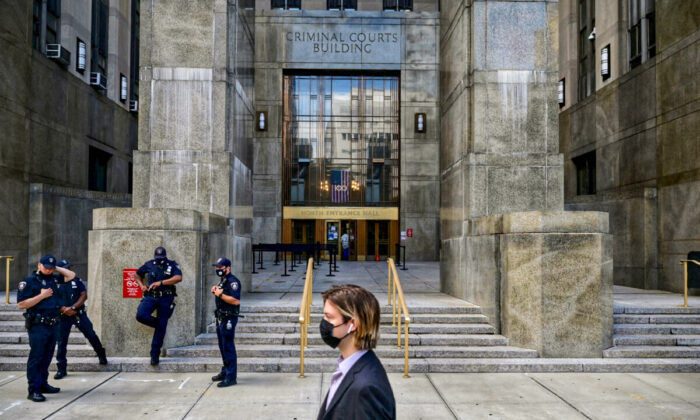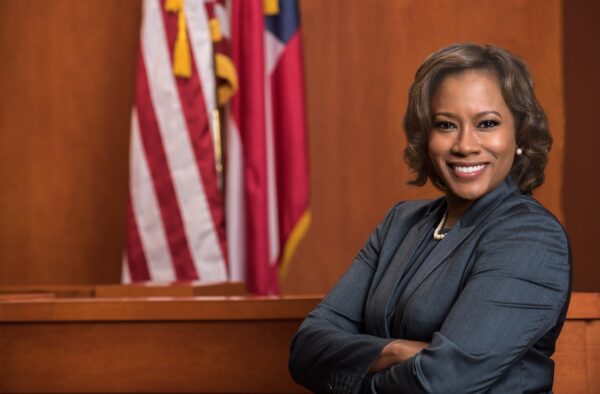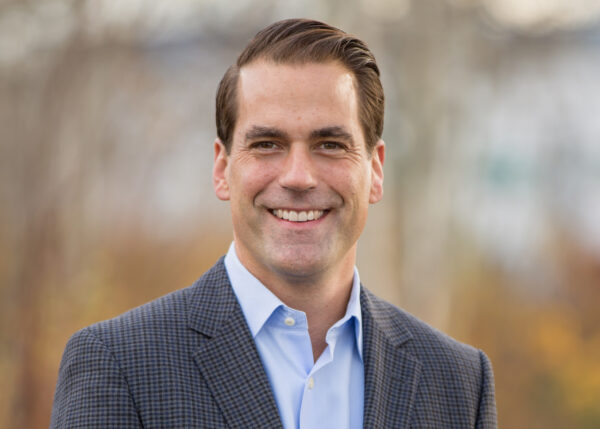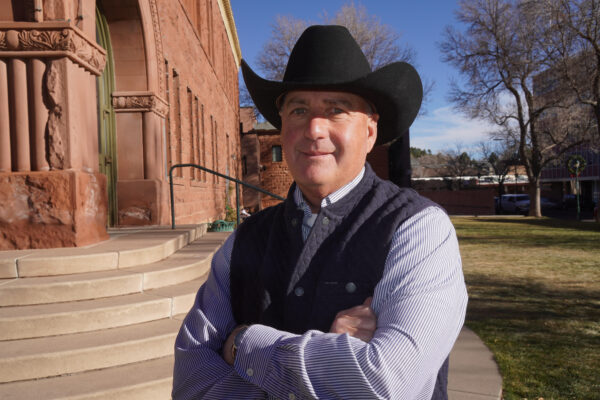
wheel of justice almost came to a grinding halt during the pandemic.
Many state courts suspended in-person proceedings for months, piling up a massive backlog that insiders say will take years to clear.
To tackle the heavy caseload, state prosecutors are using their discretion in different ways. Prosecutors decide whether a case shall be filed and hold great influence on how a case will progress within the state court system.
Some use their discretion more liberally to dismiss entire categories of crimes. Others cautiously push the envelope of prosecution on a case-by-case basis. Some are determined to bear the load the old way without compromising their prosecution standards.
-

Georgia’s Dekalb County District Attorney Sherry Boston. (Courtesy of Sherry Boston)
Sherry Boston, chief prosecutor of the Dekalb County District Attorney’s Office in Georgia, thinks an unprecedented court backlog demands a new prosecutorial response.
In April, Boston asked her team to stop prosecuting at least four categories of low-level, nonviolent crimes so there’s more time to focus on violent ones.
dropped categories include drug possession involving small amounts for personal use, forgery offenses where victims suffered no financial harm, and multiple categories of theft where victims had no financial loss, according to an internal policy memo obtained by Pezou’ “Insight” magazine.
policy applies to pending felony cases between March 13, 2020, and March 31, 2022.
Boston plans to extend the policy into 2023.
After that, she may make the policy permanent, if data suggest it’s working.
Just like chief prosecutor Marilyn Mosby did in Baltimore, she said.
Mosby stopped prosecuting nine categories of offenses during the pandemic, including drug possession, prostitution, and trespassing.
In March, she made the pandemic policy permanent, citing a John Hopkins University study that suggested Baltimore’s violent crimes dropped under the plan.
In Chicago’s Cook County, chief prosecutor Kim Foxx also stopped prosecuting nonviolent, low-level drug offenses during the pandemic, though she has yet to make the policy permanent.
Right now, Chicago faces the highest level of violence the city has seen in more than a decade—nearly 4,000 people were shot and 700 killed in 2021.
In Dekalb County, Georgia, violent crimes are also on the rise, but Boston doesn’t think there’s any evidence that suggests her new policy is the driver.
“Homicides have increased everywhere, including places where prosecutors’ offices are not engaging in reforms like ours,” she told Insight.
se policy changes are part of a progressive prosecution movement that has gained momentum since the pandemic, according to professors Chad Flanders and Stephen Galoob in a Journal of Criminal Law and Criminology article.
movement seeks to focus on violent crimes while shifting attention away from low-level drug or property crimes.
According to the article, the long-term goal is to reduce the jail population and a change of “tone” in prosecution.
For Adam Cornell, the chief prosecutor of Snohomish County in Washington, dismissing entire categories of crimes outright doesn’t seem the right approach for his office.
-

Washington’s Snohomish County prosecuting attorney Adam Cornell. (Courtesy of Adam Cornell)
“What we have not done in our office is categorically saying that there are certain crimes that we will never, ever prosecute,” Cornell said.
“I think it is in the interest of the community that we, as prosecutors, are always going to exercise our discretion.”
Shortly following court shutdowns, he created an accelerated prosecution program to get certain nonviolent felony cases to move faster within the criminal justice system.
For certain low-level property and drug crimes, if defendants plead guilty early in the process, they get the benefit of less severe charges and a much quicker decision.
Still, prosecutors have the discretion to depart from Cornell’s policy guidelines when they believe doing so would better protect community safety, Cornell said.
He also expanded the criteria of diversion programs to let more people avoid the criminal justice system while getting help with their mental or drug abuse problems.
In the past, only those who had five or fewer felony convictions—or pending felony charges—could enter the diversion program; during the pandemic, Cornell dropped the number to three, according to the internal policy memo.
“I directed my attorneys simply to exercise their discretion more liberally, with an eye toward admittance into those programs,” Cornell said.
“We are keeping an open mind and are waiting to see how law and justice stakeholders, and the community at large, respond.
“I think it’s highly likely that some policies will remain—or at least not revert to what they were prior to the pandemic.”
At the Denver District Attorney’s Office in Colorado, chief prosecutor Beth McCann chose to let each prosecutor decide the best way to tackle the caseload.
We didn’t change any charging standards or issue any guidelines specific to the pandemic, McCann told Insight.
“My attorneys are empowered to look at each case on their own and decide whether or not it’s one that they should push all the way through the system.”
Faced with trial backlogs, many of her prosecutors give better plea deals to defendants than they would have agreed to under normal conditions, she said.
That’s a nationwide phenomenon, according to a survey of 93 defense attorneys by professors Tarika Daftary-Kapur, Kelsey Henderson, and Tina Zottoli.
survey found that more than 60 percent of attorneys think prosecutors are offering more lenient deals than they would have before the pandemic.
pressure to ramp up plea deals is particularly high in Colorado.
Unlike many other states, Colorado didn’t halt the speedy trial statute during the pandemic court shutdowns, so a prosecutor could have a long docket of pending trials close to trial deadlines.
According to Colorado law, every criminal defendant has a right to have a speedy trial, within six months of a “not guilty” plea; if a trial can’t be conducted by the deadline, the case can be dismissed.
Chief prosecutor of Boulder County in Colorado Michael Dougherty is worried some cases in his office may get dismissed in coming months.
His attorneys are working very hard to prevent that from happening, he said.
“Let’s say you have a sex assault or a robbery case that can be proven beyond a reasonable doubt, the evidence is strong, the witnesses are cooperative, and we are ready to try the case. But because of the backlog, the trials are not conducted and the cases are dismissed. That means the person who would otherwise have been convicted and held responsible goes free,” Dougherty told Insight.
In that regard, the court’s shutdown and halting jury trials for months is very concerning, he said.
Though under pressure, Dougherty didn’t make any changes to his office’s standards in charging or disposing of cases.
“Our top priorities are public safety and doing justice,” he said.
“I would rather just keep working to the bitter end. I just think that we have a mission and a mandate from the community, and we should do everything we can to meet that,” Dougherty said.
That’s an understanding shared by the chief prosecutor of Coconino County in Arizona, William Ring.
-

Coconino County chief prosecutor William Ring stands outside his county office building in Flagstaff, Ariz., on Nov. 22, 2021. (Allan Stein/ Pezou)
Right now, Ring’s office has 60 cases pending trial, four times the number before the pandemic.
He has worked hard to get his prosecutors on board with new technology to conduct business remotely, but he hasn’t made any changes to the standards in charging or disposing of cases.
He said it’s the lawmakers’ job to criminalize or decriminalize certain categories of crime, not that of prosecutors.
Justice is a constant, he said, something that endures, not something flimsy or plastic that you mold to the latest fad.
“ pandemic is merely incidental and not a driver of policy,” Ring said. “If we did that, we all would lose our way.”
“Instead, it is just like bad weather, sometimes very bad. It will pass. Until then, we put up the storm sails, we keep our cargo, we stay the course.”
Pezou : Changing Face of Criminal Prosecution During a Pandemic